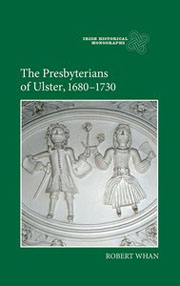Book contents
- Frontmatter
- Contents
- List of Illustrations
- Acknowledgements
- Colophon
- List of Abbreviations
- Editorial note
- Map showing principal places mentioned in the text and approximate presbytery boundaries (1704)
- Introduction
- 1 Ministers
- 2 Gentry
- 3 Merchants and Commerce
- 4 The Professions
- 5 The Lower Orders
- 6 Organisation and Religious Practice
- Conclusion
- Bibliography
- Index
3 - Merchants and Commerce
Published online by Cambridge University Press: 05 March 2014
- Frontmatter
- Contents
- List of Illustrations
- Acknowledgements
- Colophon
- List of Abbreviations
- Editorial note
- Map showing principal places mentioned in the text and approximate presbytery boundaries (1704)
- Introduction
- 1 Ministers
- 2 Gentry
- 3 Merchants and Commerce
- 4 The Professions
- 5 The Lower Orders
- 6 Organisation and Religious Practice
- Conclusion
- Bibliography
- Index
Summary
The aim of this chapter is to depict the Presbyterian urban elite of late seventeenth-and early eighteenth-century Ulster. When Presbyterian gentry families conformed to the Church of Ireland, merchants (along with professional men) were the obvious candidates to fill the vacuum in social leadership. Toby Barnard has suggested that there was not always a clear distinction between the landed elite and those operating at the higher levels of trade in Ireland. I will therefore consider the connexions between the merchants and the gentry and the distinctions and similarities between the two groups. Merchants, at least until the enactment of the sacramental test in 1704, were eligible and active in municipal and local government and it will be necessary to consider the issue of conformity and whether they conformed to the established church in order to fulfil civic ambitions. As with the gentry in England, the historiography is more extensive for English merchants than their Irish counterparts, though some important work has been completed. In addition to Barnard's work, David Dickson has written about trade and merchants in Cork and Munster, and Patrick Fagan about Catholic merchants in Dublin. With regard to Ulster, Belfast merchants (the best referenced in the sources) have been the subject of intense research by Jean Agnew, and William Roulston has given some insight into the lives of merchants based in Strabane during the late seventeenth century.
- Type
- Chapter
- Information
- The Presbyterians of Ulster, 1680-1730 , pp. 99 - 123Publisher: Boydell & BrewerPrint publication year: 2013



